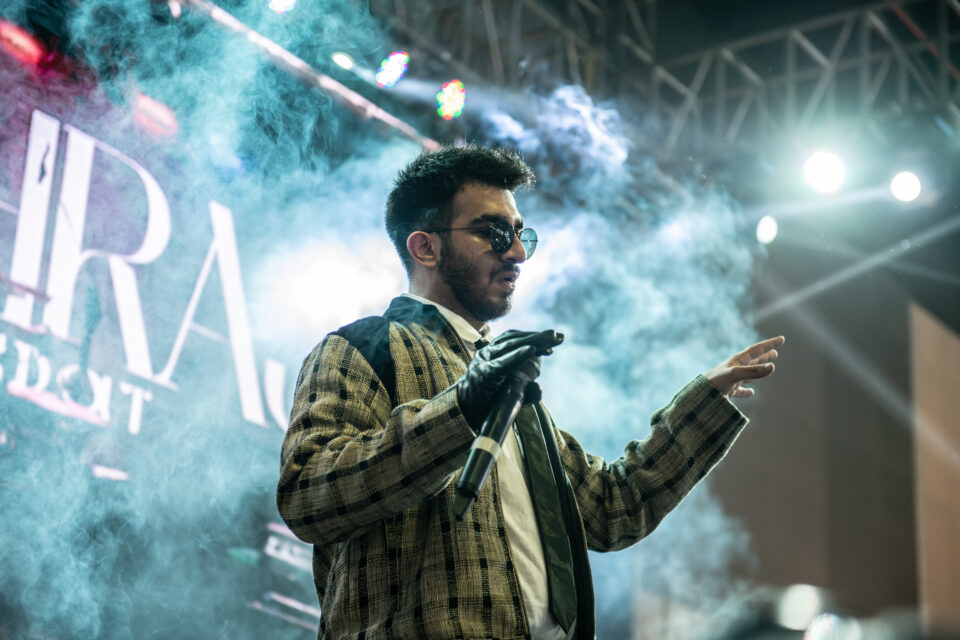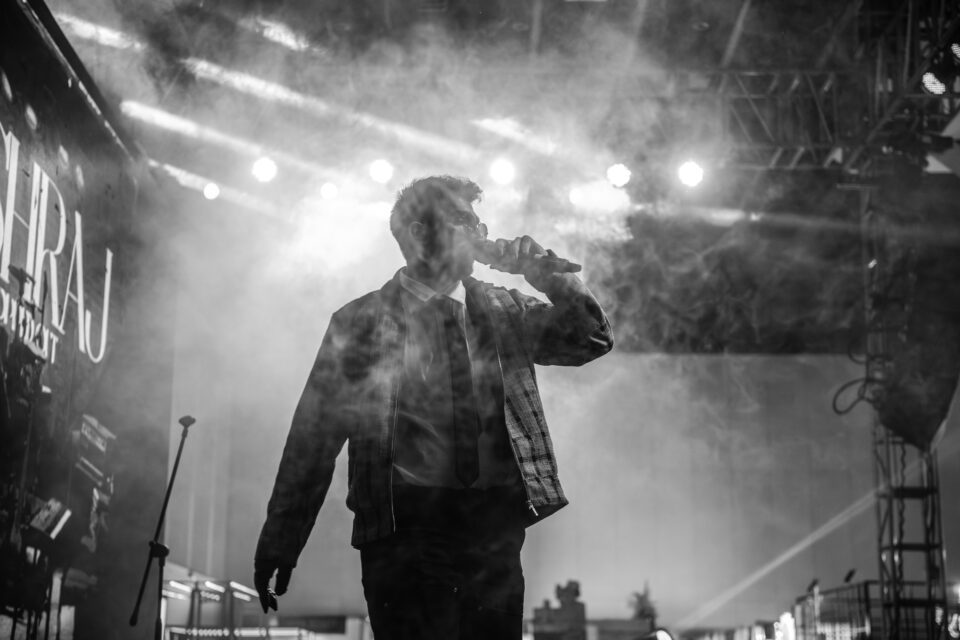
Yashraj
Young Bombay royalty takes its form in Yashraj
Affability is something that Yashraj possesses in tonnes. The young Bombay-based rapper took the Indian hip-hop scene by storm with his powerful delivery, intricately crafted lyricism, and innate hunger to prove his own mettle. With chart-topping collaborations with seasoned veterans like KSHMR and Karan Kanchan, the rapper has consistently been in the conversations of industry observers. Rolling Stone India spoke with Yashraj to explore his journey to reaching to the point of career-comfort that has allowed him to innovate to the degree that he is able to today.
Rolling Stone India: Who is Yashraj and how is he different from Yashraj Mehra?
I think Yashaj is the person that was brave enough to do everything Yashaj Mehra couldn’t or say everything that Yashaj Mehra couldn’t. So, I think I was always a kid on stage, but to have the ability to do that with my own music, to do that with my own lyricism, to do that with the same people I’ve worked with, has always been like this dream. And I think it’s the ideal self. I think me just being able to live this life, get on the stage, have that switch, which switch is real. Like the switch is really real though. Like I’m different when I’m normally operating with my friends or while I’m in the studio also.
But stage is just like home to me. So, I feel like that switch is very evident. And yeah, it’s just, it’s like my mode of expression, music, and being able to be this artist is my outlet to say anything and be whatever I can be.
Take me through your personal journey. I know you grew up in Mumbai and you mentioned in an interview that, and I found this so fascinating, your mother would read you bedtime stories? How did that affect your music?
I think the concert of Lorries was really, like I think that was the main highlight. I think my mom and my nani, I think these were two people that have sung me to sleep. Both of them respectfully don’t have that great voices, but they were absolutely phenomenal at putting me off to sleep because yeah, there was this purity, there was this magic and just falling asleep that way. I feel there’s so much of subconscious development that happens when you’re just listening to music or you’re surrounded by so much music. Like I remember my mom used to play these ghazals every time. She used to like sit and clean her room and she used to just drag me, make me sit down in that room just so that I could sit. And she used to clean her, like do her own work. And I used to just sit there, like listening to all of these ghazals, when I was like five, six years old. So when I was 10 or 12, like I could sing those ghazals, but I had no idea what I’m talking about. And everybody in my family used to be like, why don’t you listen to music of your generation? Or how don’t you remember the lyrics of music of your age? And I used to just be like, I can’t, I can’t remember the lyrics of my own generation’s music, but this is the stuff that’s imprinted in my head for such a long time. So it’s crazy how like growing up, just the exposure to the right kind of music, like I’m honestly an old head in that matter.
When was the point when you started taking a career in hip hop seriously? Was there a moment that you can recall where you said, now I’m in a space where this is what I’m committing to?
I was always a kid on stage. I was a mass media student. So I love different forms of writing, not just poetry or rap or music. There was writing scripts. We were writing short films. You were writing like, you know, essays. We were writing research papers. You were writing all of those things. So I love making short films during my like BMM days also. So I just, just that realization that the fact that I can stay behind the camera in front of the camera, the music can be mine. The writing can be mine. Everything that I can create can be solely, I can be the source of that, you know, that realization was the day. And obviously like hip hop being such an impactful culture in my life, I think I realized me, all of my creative satisfaction and all of my creative inhibitions can get fulfilled by this one genre of music called hip hop, or just take this career a little more seriously.
What importance would put on a sort of textbook education approach to music versus something that is more experimental. Do you think one is better than the other? Is there value in either?
There’s value in both formal music education and self-taught methods. Dismissing music theory outright is short-sighted; it’s more about understanding its importance rather than rejecting it. While I personally lack formal training, I make efforts to learn independently, utilizing resources like YouTube. Continuous learning is crucial in music; stagnation is a pitfall. We all have a capacity for growth, regardless of our educational path.

Talk to me about Desi Hip Hop (DHH). What does it mean to you? How have you, along with contemporaries like Chaar Diwaari, Seedhe Maut, Hanumankind, etc worked to develop the identity that it holds?
I don’t think anybody of us started off with the idea of making DHH, right? We just made the music and people termed it as that. The vision was to always build a blueprint for ourselves. It’s so exciting to see, like when we used to drop music, there used to be like back in the day, there used to be two hip hop releases a week at max. This is when I’m talking about like 2017, 18 cipher days where we used to go out at gigs. Now, when you look at it now, there are like 10 projects dropping a week. So, the best part about a culture is when it’s successful, when there’s money in it, you know? That’s the unfortunate reality, but it’s the truth of life. I don’t mean to reduce it to commerce, but the fact that people can sustain and live their lives as rappers in this country is amazing because that wasn’t the case 10 or 20 years ago.
For us to be able to live a life where we can provide to a certain extent, drop the music we want to, and still have the privilege of keep going at it every single day, I think that’s the most beautiful part of this culture. So, yeah, a hundred percent.

Has your relationship with your fans changed in the recent past? Your live shows are high-energy, often filled with an element of chaos. What is it about live performances that keep you motivated and excited?
I was supposed to release music on my birthday in 2020, but it got postponed due to the lockdown. I ended up putting out my first EP on April third of that year. Before that, I had material on YouTube, SoundCloud, and other platforms, but I lacked the confidence to share it on streaming services.
So, I’m essentially a product of the lockdown. My point is, for almost a year and a half, I’ve only been exposed to metrics, social media numbers, likes, and comments. I haven’t experienced people’s reactions to my music firsthand. It’s been complete isolation. My only feedback came from the people I interacted with on Discord or my family. The first time I performed on stage after the lockdown, the reaction of people singing along to even the most obscure songs, word for word, was everything I could have hoped for.
So, whenever I perform, I have two mindsets. Firstly, I aim to put on a show for those who know my music well. Secondly, I strive to win over those who have never heard of me. I want even those five people who are unfamiliar with my work to leave thinking, “That was an amazing show. I had a great time.” This ideology has been ingrained in me because, even before streaming platforms or extensive online marketing, bands used to tour extensively to build their reputation through word of mouth. That old-school approach still holds value to me. While I might reach a certain audience through streaming platforms, the real challenge lies in converting people in real-time during performances.
I look forward to this challenge and enjoy being genuine and spontaneous on stage. I don’t overthink things or have too many scripted elements. I simply speak from the heart. So, yeah, a hundred percent.
Where do you envision your career in the next three years? What do you as an artist aspire to provide to the Indian musical landscape that you think it hasn’t gotten yet?
There can be great music videos, everything done bootstrap, everything done with our friends. In a way where it brings this sense of community. It’s shamelessness more than anything, I feel like that’s what we need in artists. So I think we owe it to ourselves more than anybody to just go ballistic in these next three years, at least me, I feel like I don’t want to leave any stone unturned.
Finally, I think I’m in a place where I’m able to do that. With the projects that I’m working on right now, like this next EP that I’m working on, I think it’s going to be all these different sides of me that come out, I think in the most confident way possible.




